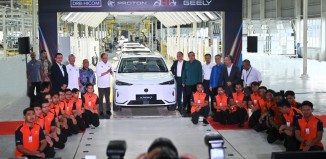Rapid Bus Buys Final Batch Of Diesel Buses Before Switch To Electric Buses
Rapid Bus Sdn Bhd, a subsidiary of Prasarana Malaysia Berhad, has received the first units of the final batch of new diesel buses under its ongoing bus replacement programme. A total of 310 new diesel buses will be introduced into service in stages beginning this month (July 2025) to replace the current aging fleet, and to play a vital role in strengthening public transport services in the Klang Valley as well as Penang.
This initiative is part of a long-term effort to enhance and modernise Malaysia’s public transportation system, particularly in densely populated market centres. It aims to replace aging buses that have been in operation for several years, with full deployment expected to continue into the first quarter of 2026. 
Strategic Transition Towards Future Electrification
According to Amir Hamdan, Chief Operating Officer (Operations) at Prasarana, this final batch is part of its strategic transition plan to ensure the continuity of safe and efficient public transportation services. Although the ultimate goal is to switch to fully electric buses, the diesel buses are still needed to ensure the company can serve the public needs while it builds up supporting infrastructure for the electric buses.
“This initiative is also aimed at replacing old buses that no longer meet current operational requirements, and to improve the passenger experience. At the same time, we remain committed to achieving long-term sustainability through the introduction of electric buses starting in 2026,” he added.
Expanded Capacity And Reach
The new 12-metre diesel buses can carry up to 60 passengers and are intended to meet current public transport demands and improve service connectivity, particularly in the Klang Valley and Penang where ridership continues to increase.
In addition, Rapid Bus will be introducing 8.9-metre mid-size buses in the 3rd quarter of 2025. These smaller buses are designed to enhance last-mile connectivity and operate in high-density residential areas or narrow roads where larger buses cannot easily access. Rapid Penang will be taking 70 units of the smaller units.
Cleaner Emissions And Future-Ready Plans
All of the new buses are Euro 5-compliant and equipped with the latest international emission control standards. These environmentally friendlier units help reduce harmful nitrogen oxide (NOx) emissions and soot particles, further supporting efforts to improve urban air quality. While the new buses are from Higer of China, they are locally assembled in Johor. 
On the longer term, Rapid Bus will gradually introduce electric buses into service beginning in 2026. This transition will be supported by investments in charging infrastructure, as well as technical training and maintenance capabilities which are currently being developed. The goal is to have a fully electrified fleet by 2037. And although the electric buses will be sourced from other countries (which will be announced later), it will be part of a local assembly programme.
By switching to electric buses, the overall exhaust emissions and noise pollution in the city will be reduced.
Strengthening The Nation’s Public Mobility Network
![]() The final delivery phase of these new diesel buses marks another important milestone in Malaysia’s public transport transformation journey toward a more modern, efficient, and environmentally friendly system.
The final delivery phase of these new diesel buses marks another important milestone in Malaysia’s public transport transformation journey toward a more modern, efficient, and environmentally friendly system.
With its continued commitment to sustainability and service excellence, Rapid Bus aims to reinforce its critical role in enabling the mobility of communities and driving national progress.
In case you aren’t aware, the Rapid fleet of buses have live tracking via the MyRapid Pulse app. The app will also help you plan your journey utilising all modes of transport under Prasarana’s management (including Monorail, MRT, LRT, BRT, Rapid buses, Smart Selangor free buses, Pavilion Bukit Jalil shuttle).
































